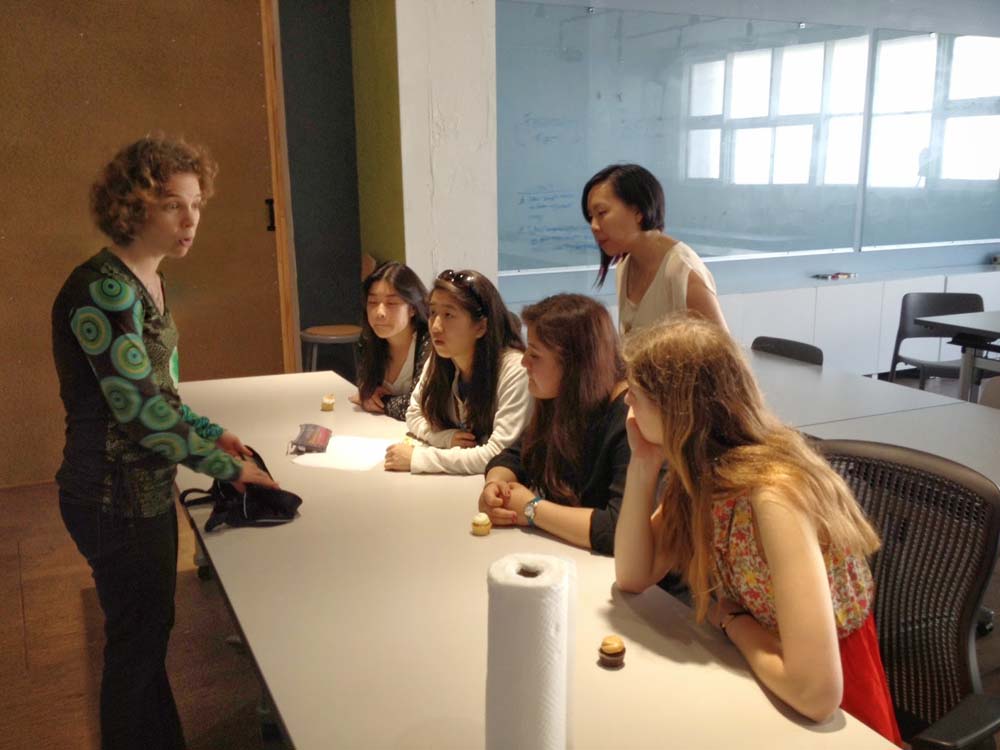
The Technovation team meets with a female entrepreneur for help with product development.
“Sexual harassment is a problem people don’t really like to talk about much, but it’s definitely there,” says junior Valerie Chen.
The lack of discussion concerning sexual harassment inspired Flare, a device and app Chen and fellow juniors Lisa Leung, Ana Mercado, and Cleo Wienbar are entering into this year’s Technovation competition.
Technovation is a technology entrepreneurship program and competition focused on getting young women interested in computer science.
“The program is very business focused: ‘How do you make a business plan? What do investors want to hear?’” adds Wienbar.
Over three months, middle school to college-age students form teams to design and develop a mobile app, and then pitch their startup to investors. This year’s theme asked the participants to address a problem in their community, and these Aragon students chose to address the vulnerability of young women to sexual assault.
When activated, the bracelet or bangle sends a message to the app. The app then sends a message to pre-selected contacts, informing them that the wearer is in danger.
“Something that we all felt was really relevant to us, just being young women, was safety,” says Chen. “Because we’re almost college-age and being independent, that also means that you don’t always have parents there to really take care of you and protect you. And sometimes it is kind of scary, being out in the world by yourself.”
Chen first heard about Technovation through a friend, and her interest piqued because she hopes to pursue a career involving computer science. She found three teammates in Leung, Mercado, and Wienbar.
Leung says, “Like Valerie, a lot of it was learning and experience because, for me, I still don’t entirely know what I want to do and [participating in Technovation] shows me what my possible career paths could be and what I could do.”
Although Mercado and Wienbar are not planning on going into computer science, they recognize the benefits of understanding technology.
“I want to go into government,” says Wienbar, “I think information software is going to become way more relevant to government work. [Also,] I like social issues, so that was sort of a nice mix, focusing on the issues of sexual assault but addressing it with technology.”
Mercado adds, “I always wanted to go into science and public health, and this kind of helps public health in a way. I do want to incorporate technology into [my career goals], to be more efficient and find more solutions.”
Once the team formed and decided on an idea, they began to code for the software on the MIT App Inventor.
“We came in expecting it to be more coding,” comments Wienbar. “App Inventor is very constraining in how it functions and how it looks.”
However, Mercado says, “The thing is, if they do incorporate coding and even if they make [the competition window] longer, it would take a lot from the business side of it.”
The team was assisted by two Technovation mentors, Alice Han and Angela Yu, who both majored in computer science in college.
“We feel like we lucked out getting matched with such a great team,” says Yu. “Alice and I keep telling each other, ‘I’m so proud of them!’ as we see how they make decisions together.”
As co-mentors, Han and Yu guided the team through the 12-week curriculum provided by Technovation.
“Angela and I talk to the team about business models, the importance of user research, competitive analysis, and other important things to consider when building a product,” Han explains. “We guide the team not only by making sure we stay on track of the curriculum, but also by sharing our experiences that can provide different insights and perspectives to shape the product.”
Yu adds, “We were also really impressed when the team took a critical look at their solution mid-challenge, realized a major flaw, and added a Bluetooth-enabled accessory to accompany the app that went beyond the parameters of Technovation. Instead of meeting the minimum requirements of the competition, they took on a bigger challenge because that was the best solution to the problem they wanted to solve.”
In the competition portion, the Technovation teams display both their app design and their business plan. Each team is then judged on how well they address the program’s curriculum, how well they pitch their startup, the soundness of their business plan, and the design of their app.
In the high school division, the winning team will receive a chance to compete globally at the World Pitch 2014 in San Francisco and win $10,000 in seed funding for their startup.
Ultimately, the team sees Technovation as a stepping stone for further growth.
Yu says, “Their greatest challenge will be to focus on how to spend their time after the program is done, because now that they’ve got a great product idea we’ve found that there is so much more to learn before they can take it to market.”



